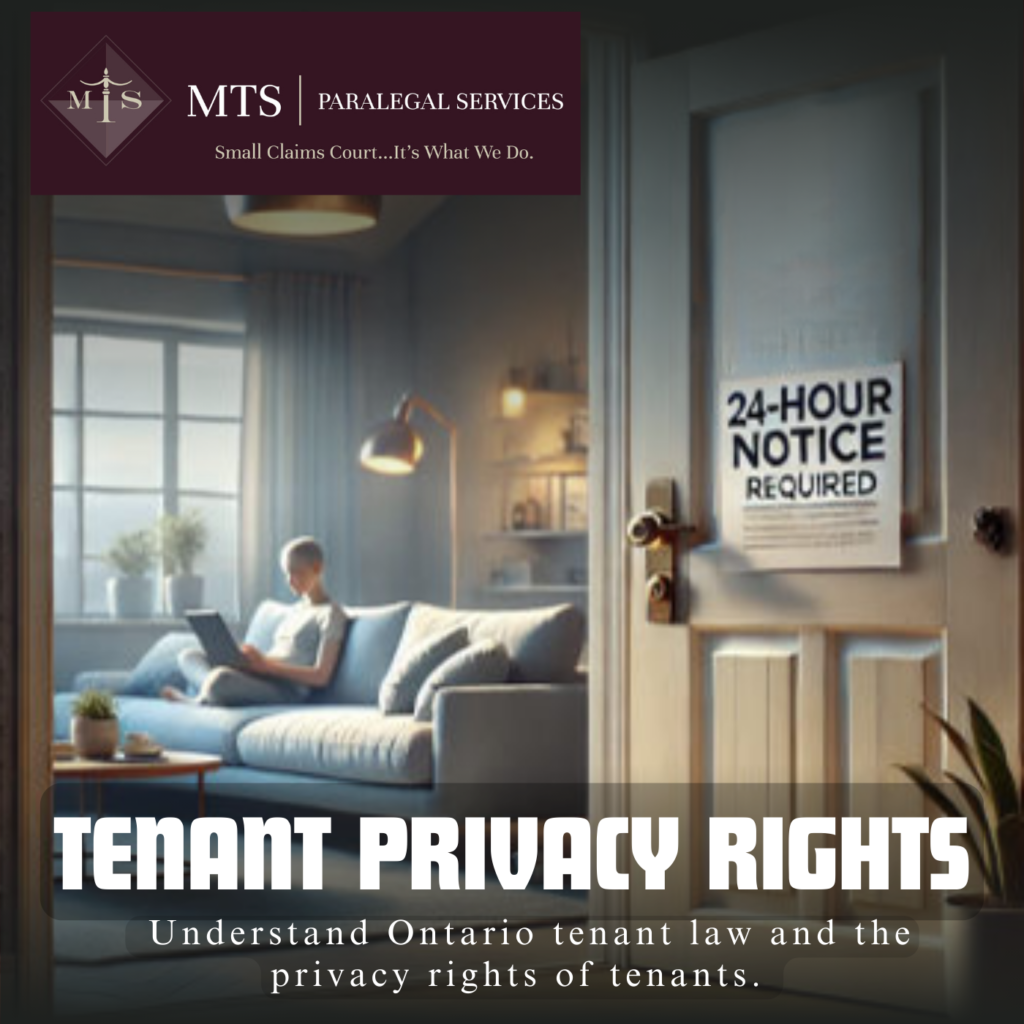
Tenant Privacy Rights in Ontario: What Landlords Need to Know
When managing rental properties, it’s essential for landlords to stay informed about the rules surrounding tenant privacy. Ontario tenant law is designed to protect the privacy rights of tenants, ensuring they feel safe and comfortable in their homes. For landlords, understanding and respecting these laws is critical to maintaining a positive relationship with tenants while avoiding potential legal conflicts. In this blog, Tim from MTS Paralegal Services will guide you through what landlords in Ontario need to know about tenant privacy rights and how to stay compliant with Ontario tenant law.
Key Tenant Privacy Rights
1. Right to Quiet Enjoyment
One of the most fundamental rights tenants have under Ontario tenant law is the right to “quiet enjoyment” of their rental property. This legal concept guarantees that tenants have the right to live in peace, free from unnecessary disturbances by their landlord or anyone else. However, “quiet enjoyment” goes beyond just noise issues—it includes the right to privacy, security, and overall comfort in their rental unit. This means landlords like Tim are required to avoid actions that could interfere with a tenant’s ability to enjoy their home, such as entering without proper notice or engaging in behaviour that disrupts their privacy. Respecting the right to quiet enjoyment is a crucial part of Ontario tenant law and one that landlords must prioritize to maintain a positive tenant relationship and avoid legal issues.
2. Notice Before Entry
Another key aspect of Ontario tenant law is the strict requirement that landlords must provide tenants with proper notice before entering their rental unit. Specifically, landlords like Tim are required to give tenants at least 24 hours’ written notice before entering, unless it’s an emergency. The notice must include the reason for the visit and specify the time of entry, which must fall between 8:00 a.m. and 8:00 p.m.. This rule exists to ensure tenants can enjoy their home without worrying about unannounced visits, which could be disruptive and an invasion of privacy.
Landlords like Tim should always provide this notice in writing, whether it’s for maintenance, repairs, or showing the unit to prospective renters. Following this process is a key aspect of Ontario tenant law, and failure to comply could lead to disputes before the Landlord and Tenant Board (LTB). Tenants have a right to know when their landlord will be entering their space, and landlords need to be aware of how important this notice is in protecting tenant privacy.
3. Emergencies and Exceptions
While Ontario tenant law generally requires landlords to give 24-hour notice before entering a rental unit, there are exceptions for emergencies. In the case of an urgent issue—such as a fire, serious water leak, or another situation that poses a threat to the tenant’s safety or the property—landlords are legally allowed to enter the unit without prior notice. However, these instances should be limited to genuine emergencies, and landlords must be prepared to justify their decision if questioned.
It’s important for landlords to remember that even in emergencies, tenant privacy should be respected as much as possible. Although entry without notice may be necessary, landlords must still act in a professional and respectful manner, ensuring that the tenant’s personal space is not unnecessarily disrupted. Understanding when exceptions apply and how to handle them in line with Ontario tenant law is essential for landlords who wish to remain in good standing with their tenants.
4. Use of Surveillance Cameras
Surveillance is another area where Ontario tenant law offers important protections for tenant privacy. While landlords may install security cameras in common areas of a rental property, they must do so with care to avoid violating tenants’ rights. Ontario tenant law prohibits the installation of cameras inside rental units, even with tenant consent, as this would be considered an invasion of privacy. Any security cameras in common areas, such as hallways or entrances, must be used solely for security purposes and must comply with Canadian privacy regulations, including the Personal Information Protection and Electronic Documents Act (PIPEDA).
For landlords, it’s essential to remember that while security is important, it should never come at the expense of tenant privacy. Tim advises that if cameras are installed, tenants should be informed about their purpose and placement to avoid misunderstandings. Failing to comply with these regulations under Ontario tenant law could result in serious legal consequences, including tenant complaints to the Landlord and Tenant Board.
Legal Support and Compliance with Ontario Tenant Law
Respecting tenant privacy is not just about following the rules—it’s about building trust with your tenants and ensuring a respectful, professional relationship. Landlords like Tim need to be fully aware of the legal obligations set out by Ontario tenant law to avoid conflicts and protect their rights as property owners. By adhering to the principles of privacy, such as providing proper notice before entry and using surveillance responsibly, landlords can create a comfortable and secure environment for tenants.
If you’re a landlord dealing with tenant privacy concerns or navigating Ontario tenant law, Tim at MTS Paralegal Services can offer expert legal assistance. Whether it’s providing legal advice, helping with disputes, or representing landlords before the Landlord and Tenant Board, Tim is here to ensure your rental business runs smoothly and within the boundaries of the law. Don’t hesitate to reach out to MTS Paralegal Services for help understanding or resolving any issues related to tenant privacy.
This content does not constitute legal advice. For up-to-date guidance or legal advice specific to your situation, please contact MTS Paralegal Services Professional Corporation or call (226) 444-4882.
